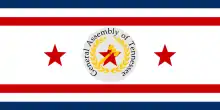 | |
| The Tri-Star Flag | |
| Use | Civil and state flag |
|---|---|
| Proportion | 3:5 |
| Adopted | April 17, 1905 |
| Design | A blue circle with three white five-pointed stars on a rectangular field of red, with a strip of white and blue on the fly. |
| Designed by | Col. Le Roy Reeves[1] |
The flag of Tennessee displays an emblem on a field of red, with a strip of blue bordered by white on the fly. The emblem in the middle consists of three stars on a blue circle also with a white border. The central emblem portion of the flag has been adopted as the state's unofficial logo, and appears in the logos of some Tennessee-based companies and sports teams. Examples include the First Horizon Bank and the Tennessee Titans.
In 2001, the North American Vexillological Association surveyed its members on the designs of the 72 U.S. state, territorial, and Canadian provincial flags and ranked the Tennessee flag 14th.[2]
History
As the American Civil War was approaching in 1861, a flag was initially proposed for the state.
In 1897, Tennessee adopted a red, white, and blue tricolor.[3] The three bars were deliberately slanted in an effort to represent the geographically distinct regions of Tennessee. The flag included the number "16", Tennessee having been admitted as the 16th state of the Union, and the words "The Volunteer State", the state's official nickname.
The current flag was designed by Colonel Le Roy Reeves,[4] a Johnson City attorney who was then serving in the Tennessee National Guard.[5] The Tennessee General Assembly officially adopted the flag on April 17, 1905.[6]
Description
Symbolism

The stars represent the three geographically and legally distinct Grand Divisions of Tennessee (i.e. East, Middle, and West Tennessee). The blue circle around the stars represents the unity of those grand divisions. The blue bar at the edge of the flag was just a design consideration. When asked about the blue bar, Reeves stated "The final blue bar relieves the sameness of the crimson field and prevents the flag from showing too much crimson when hanging limp." In October 1917, National Geographic erroneously reported the stars represented the state as the third to enter the Union after the original thirteen.[7]
Vexillologist Steven A. Knowlton believes that "the Tennessee flag has pragmatic unity with the Confederate flag: both share the element of white stars inside a fimbriated blue charge, and the element of that blue charge on a red field." He also notes the resemblance between the Tennessee State Flag and the third national flag of the confederacy.[8] However, Knowlton also acknowledged that there is no direct evidence of the flag being designed to emulate the Confederate flag.[9]
Star arrangement
State law dictates exactly how the central emblem is to be displayed on the flag.
The arrangement of the three (3) stars shall be such that the centers of no two stars shall be in a line parallel to either the side or the end of the flag, but intermediate between the same; and the highest star shall be the one nearest the upper confined corner of the flag.[7]
In 1976, the U.S. Postal Service issued a sheet of 13 cent stamps illustrating U.S. state flags. Tennessee's was illustrated upside down.[10]
Government flags
Alongside the state flag, there are other flags used by the government of Tennessee. The flag for the governor of Tennessee (shown at right) has been in use since 1939. It is a scarlet flag, with four stars, one in each corner, and the state military crest, a tree with three white stars, in the center. The Tennessee General Assembly has its own flag as well.
Gallery
.svg.png.webp) Proposed flag (1861)
Proposed flag (1861)
.png.webp) Flag of Tennessee
Flag of Tennessee
(1897–1905)
 Flag of the governor
Flag of the governor Flag of the General Assembly
Flag of the General Assembly
See also
References
- ↑ https://archive.org/details/ancestralsketche00reev/page/n11/mode/1up?view=theater "Ancestral sketches by Reeves, Le Roy, 1876-1960
- ↑ Kaye, Ted (June 10, 2001). "New Mexico Tops State/provincial Flags Survey, Georgia Loses By Wide Margin". NAVA News. Vol. 34, no. 2 Issue #170. North American Vexillological Association. pp. 4–5. Archived from the original on June 6, 2011. Retrieved November 10, 2021.
- ↑ Huff, Caitlin (January 6, 2021). "The Tri-Star Flag: What's behind the beloved emblem". WKRN.com. Retrieved February 14, 2023.
- ↑ Reeves, LeRoy (1951). Ancestral sketches. Allen County Public Library Genealogy Center. Lynchburg, Va. : J.P. Bell.
- ↑ Reeves, LeRoy. LeRoy Reeves Papers, Fonds: AppMs-9, Series: Tennessee state flag material, Box: 2. Johnson City, Tennessee: Archives of Appalachia, East Tennessee State University. (Accessed November 10, 2021.)
- ↑ Darnell, Riley C. (2006). Tennessee Blue Book (PDF). Nashville, Tennessee: State of Tennessee. pp. 515–516. Archived from the original (PDF) on July 23, 2015.
- 1 2 "Tennessee State Flag". Tennessee Military Department. Archived from the original on January 14, 2008. Retrieved October 26, 2007.
- ↑ Knowlton, Steven (2013). "Evocation and Figurative Thought in Tennessee Flag Culture". Raven: A Journal of Vexillology. 20: 23–53. doi:10.5840/raven2013203. Retrieved January 24, 2022.
- ↑ Lubbers, Eric J. (2015). "Echoes of the Confederacy". The Denver Post. Archived from the original on January 7, 2022. Retrieved August 29, 2022.
- ↑ "Knoxville Philatelic Society News" (PDF). stampclubs.com. February 2008. Archived from the original (PDF) on July 16, 2011. Retrieved February 12, 2010.